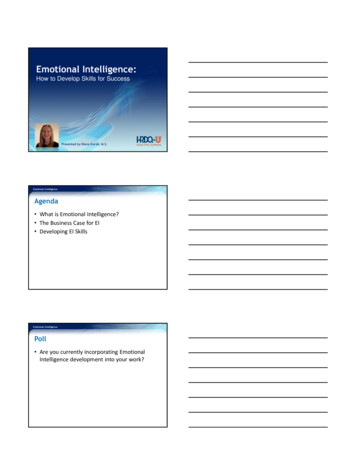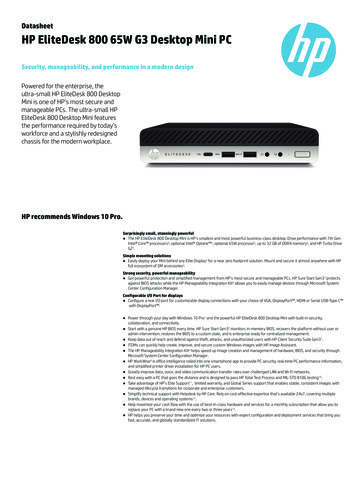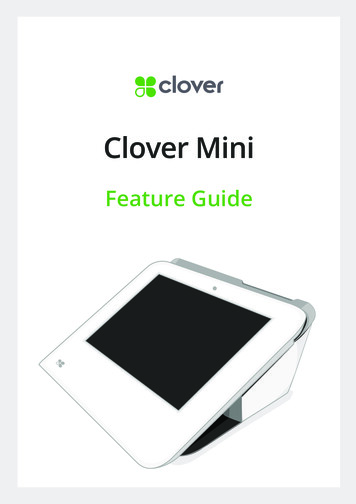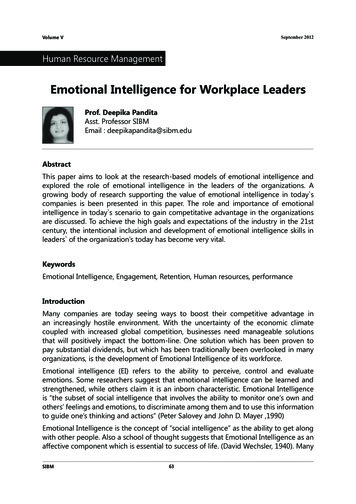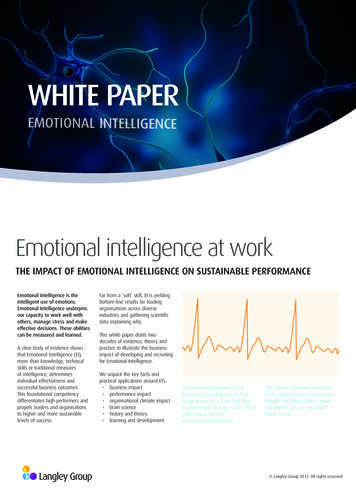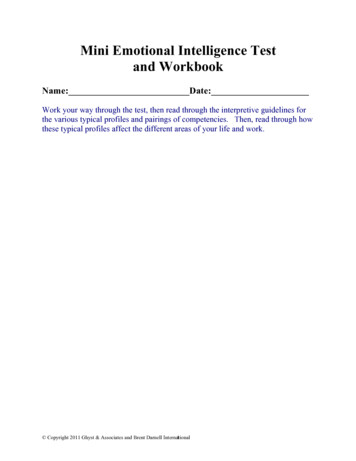
Transcription
Mini Emotional Intelligence Testand WorkbookName: Date:Work your way through the test, then read through the interpretive guidelines forthe various typical profiles and pairings of competencies. Then, read through howthese typical profiles affect the different areas of your life and work. Copyright 2011 Ghyst & Associates and Brent Darnell International1
1Ihaveahealthylevelofself- (A)STRONGLYAGREE(SA)EmotionalandSocialSkills54321
landSocialSkills54321
sumptions.34I'mnotquicktoangerorhot- REE(SA)EmotionalandSocialSkills54321
6DIRECTIONSFor each competence below, go to the statements listed and add up your total resultsfor those three statements. For each 3-statement competency: If you scored 3-9 total, this is probably an area that needs improvement. If you scored 10-11 total, your score is better, but still indicates you’d likelybenefit from improvement. If you scored 12-13 total, you are probably in the average range. If you scored 14-15 total, you are probably above average in this area.Often the most revealing aspect of this assessment is the degrees of differencebetween different scores, an amazingly helpful indicator of performance and behavior.Graph your results on the graph page.SELF-PERCEPTIONSelf-Regard (Statements 1-3) is respecting oneself while understanding andaccepting one’s strengths and weaknesses. Self-regard is often associated withfeelings of inner strength and self-confidence.Total points:Self-Actualization (Statements 4-6) is the willingness to persistently try to improveoneself and engage in the pursuit of personally relevant and meaningful objectives thatlead to a rich and enjoyable life.Total points:Emotional Self-Awareness (Statements 7-9) includes recognizing andunderstanding one’s own emotions. This includes the ability to differentiate betweensubtleties in one’s own emotions while understanding the cause of these emotions andthe impact they have on the thoughts and actions of oneself and others.Total points:SELF EXPRESSIONEmotional Expression (Statements 10-12) is openly expressing one’s feelingsverbally and non-verbally.Total points:Assertiveness (Statements 13-15) involves communicating feelings, beliefs, andthoughts openly, and defending personal rights and values in a socially acceptable,non-offensive, and non-destructive manner.Total points:Independence (Statements 16-18) is the ability to be self-directed and free ofemotional dependency on others. Decision-making, planning, and daily tasks arecompleted autonomously.Total points:Copyright 2012 Ghyst & Associates and Brent Darnell International
7INTERPERSONALInterpersonal Relationship (Statements 19-21) refers to the skill of developingand maintaining mutually satisfying relationships that are characterized by trust andcompassion.Total points:Empathy (Statements 22-24) is recognizing, understanding, and appreciating howother people feel. Empathy involves being able to articulate your understanding ofanother’s perspective and behaving in a way that respects the feelings of others.Total points:Social Responsibility (Statements 25-27) is willingly contributing to society, toone’s social groups, and generally to the welfare of others. Social Responsibilityinvolves acting responsibly, having social consciousness, and showing concern for thegreater community.Total points:DECISION MAKINGProblem Solving (Statements 28-30) is the ability to find solutions to problems insituations where emotions are involved. Problem solving includes the ability tounderstand how emotions impact decision making.Total points:Reality Testing (Statements 31-33) is the capacity to remain objective by seeingthings as they really are. This capacity involves recognizing when emotions orpersonal bias can cause one to be less objective.Total points:Impulse Control (Statements 34-36) is the ability to resist or delay an impulse,drive, or temptation to act. It involves avoiding rash behaviors and decision making.Total points:STRESS MANAGEMENTFlexibility (Statements 37-39) is adapting emotions, thoughts, and behaviors tounfamiliar, unpredictable, and dynamic circumstances or ideas.Total points:Stress Tolerance (Statements 40-42) involves coping with stressful or difficultsituations and believing that one can manage or influence situations in a positivemanner.Total points:Optimism (Statements 43-45) is an indicator of one’s positive attitude and outlookon life. It includes remaining hopeful and resilient, despite occasional setbacks.Total points:Copyright 2012 Ghyst & Associates and Brent Darnell International
8WELL BEING INDICATORHappiness (Statements 46-48) is the ability to feel satisfied with one’s life, to enjoyoneself and others, and to have fun.Total points:Note: Although this evaluation may give an indication of areas which needimprovement, it should not be used for in-depth, personal development. In order todo that, we recommend that you take the Emotional Quotient Inventory (EQ-i) 2.0, thevalidated and most widely-used emotional intelligence evaluation in the world. You canthen obtain feedback on your results from a qualified, certified emotional intelligenceprofessional. Visit our website and online store for more information.Copyright 2012 Ghyst & Associates and Brent Darnell International
9GRAPHING YOUR RESULTS FOR ANALYSIS / egardSelf- ActualizationEmotional Self-AwarenessSELF-EXPRESSIONEmotional terpersonal RelationshipEmpathySocial ResponsibilityDECISION MAKINGProblem SolvingReality TestingImpulse ControlSTRESS MANAGEMENTFlexibilityStress ToleranceOptimismWELL BEING INDICATORHappinessCopyright 2012 Ghyst & Associates and Brent Darnell International
10INTERPRETIVE GUIDELINESEQi:It is desirable to have a balanced emotional profile. Avoid the trap of thinkingthat a high number is good and a low number is bad. Any strength taken tothe extreme may become a weakness, especially if the balancing competency islow. For example: assertiveness is a great leadership skill, but if it is high andempathy is low, you may be perceived as someone who doesn’t listen, doesn’task for input or opinions, and is a know-it-all. Look at the highs and lows ofyour EQi and see the following descriptions of the way people may perceiveyou.SELF PERCEPTION COMPOSITESELF-REGARDHigh: Arrogant, full of yourself.Low: Shy, lack confidence.SELF-ACTUALIZATIONHigh: Have a clear plan for your future, feel good about the direction of yourlife.Low: No plan, aimless, no clear vision for future, unhappy in present situation,you may see no way out.EMOTIONAL SELF AWARENESSHigh: Overly sensitive to comments, to others, and possibly to yourenvironment.Low: Unaware of others, your surroundings, and even your body, you “checkout” often.SELF EXPRESSION COMPOSITEEMOTIONAL EXPRESSIONHigh: Easy to win the trust of those who appreciate exuberant expressiveness,though may alienate those who are more reserved.Low: The opposite: more likely to fail to connect with those who are expressive- but generally better received by emotionally reserved types.ASSERTIVENESSHigh: Bowl people over, don’t take into account others’ feelings or input often perceived as aggressive.Low: Don’t speak what is on your mind, don’t stand up for yourself, aren’tclear in setting expectations or declaring own needs.Copyright 2012 Ghyst & Associates and Brent Darnell International
11INDEPENDENCEHigh: Would rather work alone and be alone, not comfortable in groups orteams or social settings.Low: Dependent on others for self worth, would rather be told what to do,thrive in groups and teams.INTERPERSONAL COMPOSITEINTERPERSONAL RELATIONSHIPHigh: Gregarious, have a lot of friends, create instant rapport, stay in touch.Low: Uncomfortable in social settings and meeting new people, do not stay intouch, may come across as a wallflower.EMPATHYHigh: Very sensitive to the needs of others and their feelings.Low: Oblivious to others and their needs and feelings.SOCIAL RESPONSIBILITYHigh: Great team member, good neighbor, joiner, like to interact with groups,very social.Low: You do not do well in groups or teams, not social; don’t like to be amember of groups.DECISION MAKING COMPOSITEPROBLEM SOLVINGHigh: Able to arrive at workable solutions to problems quickly and understandhow emotions can affect problem solving.Low: You struggle with defining problems and arriving at solutions and areoften overwhelmed emotionally by the problem-solving process.REALITY TESTINGHigh: You see things as they really are despite emotions surrounding thesituation.Low: See all of the possibilities, do not investigate or reflect on the specificfacts of a situation, live in a world where objective reality is unclear.IMPULSE CONTROLHigh: ‘Paralysis of analysis,’ over-thinks things, won’t pull the trigger.Low: You may have compulsive or addictive behavior such as eating, drinking,gambling, smoking, sex, spending, talking, etc., in which there is a consistent‘hijacking’ of your long-term best interests - resulting in possible profoundphysical as well as emotional effects.Copyright 2012 Ghyst & Associates and Brent Darnell International
12STRESS MANAGEMENT COMPOSITEFLEXIBILITYHigh: Trouble saying no, take on too much, float from one thing to the next,trouble finishing things. Physical correlation: Sugar Handling.Low: Very rigid in your approach to things, want to maintain control.STRESS TOLERANCEHigh: Have the ability to handle a lot of stress, good coping skills. Note: Wehave found that some people with very high stress tolerance may first start toshow physical signs of stress like fatigue, headaches or other pains, stomachissues, trouble sleeping, irritability, diminished sex drive, lowered immuneresponse, and depression.Low: Cluttered, harried, hurried, reactive, unable to stay on top of things,probably have symptoms of stress, feel overwhelmed.OPTIMISMHigh: You consistently see your future as bright and sunny, sometimes to yourown detriment. - Glass half full.Low: The curmudgeon who always looks on the dismal side of life. - Glass halfempty.WELL BEING INDICATORHAPPINESS:High: Shiny, happy person who always seems to be in a good mood and full ofjoy.Low: Always seem down and out, life is not fun, you find no joy,Copyright 2012 Ghyst & Associates and Brent Darnell International
13If you see these relative emotional highs and lows, ESPECIALLY theunderlined competencies, you have theSELF SACRIFICE PROFILE:High: empathy, self awareness, interpersonal relationships, socialresponsibility, flexibilityLow: assertiveness, independence, emotional expression, stresstolerance, self-regardHow does this Self Sacrifice Profile affect the following?:Time Management: Because you may not set proper limits and boundaries andare reluctant to say no, you will likely take on too much and be pulled intoother people’s agendas. This adds to stress levels and your work suffers.Relationships: You may have scored lower in relationship skills because yourrelationships may not be mutually satisfying. You may give more than you get.Self sacrificers think that when they start setting better limits and boundaries,that people won’t like them anymore. The opposite is true. These limits createclear expectations and communication.Team Interaction: You are a great team member, but you may not speak upand contribute your ideas.Communication: Because you may be reluctant to say what you are thinkingand feeling, there may be miscommunications. You may overpromise andunder-deliver because you don’t want to say no.Presentation Skills: You may be reluctant to “put yourself out there” andconnect with the audience.Copyright 2012 Ghyst & Associates and Brent Darnell International
14Stress Management: Because you say yes a lot and don’t set limits, you willlikely take on too much and be overwhelmed much of the time. Stress levelsstay high.Things to Work On: Assertiveness is the key to this profile. Be clear in yourcommunications. Set better limits and boundaries. Begin each day with YOURlist of things to accomplish and don’t be pulled off track by others. Have timeswhen your door is closed. When these communications are clear, there is adeeper level of understanding.Copyright 2012 Ghyst & Associates and Brent Darnell International
15If you see these relative emotional highs and lows, ESPECIALLY theunderlined competencies, you have theALPHA PROFILE:High: assertiveness, self regard, and/or independenceLow: empathy, self awareness, social responsibility, interpersonalrelationships, impulse control, emotional expression, flexibilityNote: Alphas also tend to have the Control/Puppet Master/Perfectionist profile.See the next pages for that profile definition.How does this Alpha Profile affect the following?:Time Management: You may take on way too much because you don’t thinkanyone can do it as well as you can. You may have trouble delegating.Relationships: Doesn’t listen, doesn’t ask for opinions or input from others.Takes charge, takes over. If coupled with high self regard, may be seen asarrogant.Team Interaction: Has a tendency to take over and not work in a collaborativeway.Communication: Poor listening skills. Lack of understanding of others and theirneeds.Presentation Skills: Usually good presenters, but lower empathy prevents aconnection with the audience and understanding what they want.Stress Management: Alphas are frequently stressed and hurried. They rarelytake the time for themselves or build in daily reflection and recovery time.Things to Work On: Empathy is a big key for alphas. By tuning in more to theneeds of others, you create more intimate connections with others, which willhelp with your success both personally and professionally.Copyright 2012 Ghyst & Associates and Brent Darnell International
16Abrasive: A sub-profile of the Alpha ProfileFor alphas, if you see a difference of 2 to 4 points or more betweenassertiveness and empathy, you may be perceived as abrasive, abrupt, andwithout tact. You likely don’t listen well, don’t ask for opinions or input fromothers, and tend to take charge or take over. If coupled with high self regard,you may be seen as arrogant. At its most extreme, these ultra alphas can beseen as aggressive, abusive, or bullying.High: AssertivenessLow: EmpathyCopyright 2012 Ghyst & Associates and Brent Darnell International
17If you see these relative emotional highs and lows, ESPECIALLY theunderlined competencies, you have theCONTROLLER /PUPPET MASTER/PERFECTIONIST PROFILE:High: reality testing, problem solving, impulse controlLow: flexibilityLook at self-regard. If self-regard is low, you may be a perfectionist who beatsyourself up because you don’t live up to your own standards. If self-regard ishigh, you think that no one else can do it better than you. Either way, peoplewith this profile have a hard time letting go of control and delegating. You tendto be a workaholic, but are rarely seen as a leader. This is one of thebiggest stumbling blocks to moving past a middle managementposition.How does this Control/Puppet Master/Perfectionist Profile affect thefollowing?:Time Management: Trouble delegating. You tend to work a lot, but never geteverything done. You won’t let others do things their way. You won’t let themmake their mistakes. You are the go to problem solver. You stay in thedetails.Relationships: You may try to control too many things in relationships, whichleads to conflicts. Remember, you can be right or you can be happy.Team Interaction: You tend to try and control the process and control thedirection of the team. Negatively affects collaboration and the team process.Communication: Preconceptions on how things should be may preventunderstanding and connection with others.Presentation Skills: May be rigid in your approach to presenting. Try beingmore spontaneous and improvisational. You don’t have to have a perfectspeech.Copyright 2012 Ghyst & Associates and Brent Darnell International
18Stress Management: Overwhelmed because of lack of delegation. Works toomuch. Wants to be in on all decisions and know all information and details.Things to Work On: Flexibility: with yourself, with others, with outcomes. Byhaving a more flexible approach. Delegate more. Ask yourself: Is it wrong, oris it just different? Also, better stress tolerance can be helpful.Copyright 2012 Ghyst & Associates and Brent Darnell International
19If you see these relative emotional highs and lows, ESPECIALLY theunderlined competencies, you have theANGER, FRUSTRATION, IMPATIENCE PROFILE:High: Assertiveness,Low: Impulse Control, FlexibilityHow does this Anger, Frustration, Impatience Profile affect thefollowing?:Time Management: When experiencing anger, your thinking brain shuts down.This cognitive impairment reduces efficiency.Relationships: Explosions directed toward others creates negative experiencesand diminishes relationships. People won’t come to you with anything negativefor fear of an explosion.Team Interaction: Team members may not connect with you. Your explosivenature diminishes interactions.Communication: Anger, frustration, and impatience limits your communicationskills. People will avoid you and not share information because of you overreactions.Presentation Skills: May have trouble settling into a calm, easy presentation.Stress Management: This is a huge factor that adds to stress levels. You are ina low level fight or flight most of your day, which wears you out. By the end ofthe day, you are likely exhausted.Things to Work On: Work on impulse control and empathy. Empathy willdecrease assertiveness and impulse control will help with the reactions.Remember, respond instead of react.Copyright 2012 Ghyst & Associates and Brent Darnell International
20If you see these relative emotional lows, you have theBURNOUT PROFILE:Low: self-regard, interpersonal relationships, self-actualization, stresstolerance, optimismFour or five out of five total burnout. Three out of five highly stressed.Two out of five pay attention. These five competencies contribute to anoverall level of happiness and well being. Your happiness score may be low aswell.Low stress tolerance indicates an inability to handle stressful situations,especially when there are strong emotions involved. You feel overwhelmed andhurried.How does this Burnout Profile affect the following?:Time Management: Don’t have the energy to get all of your work done.Overwhelmed, in fight or flight, cognitive processes impaired.Relationships: Very little time and energy for the relationships in your life andwork. May come across as withdrawn and disinterested.Team Interaction: In survival mode, don’t create connections and interactions,also too tired to contribute, you do the minimum.Communication: Cognitive impairment reduces communication ability. Also,because you are exhausted, you may come across as disinterested.Presentation Skills: Great presentation is all about energy. When your energyis low, there is no connection with the audience.Stress Management: Self explanatory.Copyright 2012 Ghyst & Associates and Brent Darnell International
21Things to Work On: Stress Management is a key here. Build in recoverythroughout your day. In addition, if your emotional self-awareness is low, thatis the place to begin. You must be able to identify when you are tired,overwhelmed, etc. You must know what is happening in your body.Racing Toward Burnout, a Sub-Profile of the Burnout Profile:NOTE: If you have high stress tolerance, but also are experiencing the physicalsymptoms of stress (trouble sleeping, headaches or other pain, fatigue,stomach problems, diminished immunity: frequents colds or flu, diminished sexdrive, diminished cognitive ability, melancholy or depression) you are racingtoward burnout. Just because you have the capacity to cope with stressemotionally doesn’t mean it’s not taking its toll on your body.Copyright 2012 Ghyst & Associates and Brent Darnell International
22If you see these relative emotional highs and lows, you have theCHAOS, REACTIVE MANAGEMENT PROFILE:High: Stress ToleranceLow: Impulse ControlHow does this Chaos/Reactive Management Profile affect thefollowing?:Time Management: You get a lot done, but are just reacting to things. You donot plan proactively. You will usually have low problem-solving skills as well.Work place usually cluttered and cramped.Relationships: No time for meaningful relationships. Reacts to everything.Team Interaction: Living in a world of chaos, team interactions are usuallyfrantic and frazzled.Communication: You don’t take the time to cultivate relationships. You maybe trying to check emails and work while you are interacting with others.Presentation Skills: Disorganization contributes to poor presentations.Stress Management: Always feeling behind, on the treadmill. Feeling stressconstantly.Things to Work On: Increase impulse control while working on managingstress. Remember, respond instead of react.Copyright 2012 Ghyst & Associates and Brent Darnell International
23OVERLY OPTIMISTIC PROFILE: Glass half fullHigh: OptimismLow: Reality TestingHow does this Overly Optimistic Profile affect the following?:Time Management: You think you can get more done than you actually can, soyou tend to try to schedule too much.Relationships: People like to be around optimistic, upbeat people. Sometimesover-commitment can lead to misunderstandings and not honoring promises.Team Interaction: Unrealistic expectations that cannot be met.Communication: May over-reach with expectations and not communicateclearly with details.Presentation Skills: Good for presenting. Optimistic, upbeat energy is amagnet.Stress Management: Mostly good for stress management. Optimistic peopletend to cope with stress better, but over-committing and taking on too muchmay add to stress.Things to Work On: Would benefit from reality checks with someone you trust.Try to temper your optimism with reality checks.Copyright 2012 Ghyst & Associates and Brent Darnell International
24PESSIMIST OR REALIST PROFILE: Glass half emptyHigh: Reality TestingLow: OptimismHow does this Pessimist Profile affect the following?:Time Management: Negative attitude may reduce performance and results.May get mired down in all of the things that are impediments to progress.Relationships: People shy away from negative people.Team Interaction: Bring the team down. Be the curmudgeon who always looksat the negative side.Communication: May take communications down a negative path by focusingon the negative.Presentation Skills: Audiences may not connect with a negative presentation ofa message.Stress Management: Pessimistic people have higher levels of stress.Things to Work On: Increase optimism and create more balance.benefit from reality checks with someone you trust.Copyright 2012 Ghyst & Associates and Brent Darnell InternationalWould
25TEAM PLAYER PROFILE:High: Social ResponsibilityLow: IndependenceHow does this Team Player profile affect the following?:Time Management: You may take on too much for the team and not be able tocomplete your own work.Relationships: Generally good at relationships, especially in a team setting.Team Interaction: Excellent with team and collaboration. But may be reluctantto contribute your own ideas.Communication: Your lower independence may hinder good communication ifyou hold back saying what is on your mind. But generally, these folks are goodcommunicators.Presentation Skills: Good presenters. Good connections with audiences.Stress Management: You may take on too much, which adds to stress levels.Things to Work On: If there is a large gap between independence and socialresponsibility (2 to 4 points or greater), you may want to work onindependence to create some balance. Assertiveness would also be helpful tocreate the balance.Copyright 2012 Ghyst & Associates and Brent Darnell International
26THE LONER PROFILE:High: IndependenceLow: Social ResponsibilityWould benefit from reality checks with someone you trust. Glass half empty.How does this Loner profile affect the following?:Time Management: Watch isolation that may lead to overwhelm and not relyingon others for help.Relationships: Generally, relationships are not strong. Can be held back by alack of relationships and social networks.Team Interaction: Sometimes a good contributor, but usually behind thescenes.Communication: Without meaningful connections and relationships, sometimescommunication is on a superficial level.Presentation Skills: Generally low energy for presentations and not a greatconnection with the audience.Stress Management: Stress levels can be high, especially if you don’t ask forhelp.Things to Work On: Work on social responsibility and relationships (especially ifthere is a difference of 2 to 4 points or greater)Copyright 2012 Ghyst & Associates and Brent Darnell International
27If you see these relative emotional highs and lows, you have theCHASES SHINY OBJECTS PROFILE:High: FlexibilityLow: Impulse ControlHow does this Chases Shiny Objects profile affect the following?:Time Management: Generally cluttered work space. You start more than youfinish and go from one thing to the next.Relationships: You may come across as scattered and unfocused. This maynegatively affect relationships.Team Interaction: Scattered and unfocused, team members may not trust youto complete and contribute.Communication: Hard to pin down. Unclear communication at times.Unfocused.Presentation Skills: Presentations seem to be scattered. Goes down rabbittrails and loses the audience.Stress Management: Stress levels can be high. You rarely slow down and buildin recovery.Things to Work On: Increase impulse control and assertiveness, which willreduce flexibility. Would benefit from learning rhetoric for communication andpresentations.Copyright 2012 Ghyst & Associates and Brent Darnell International
28CONTACT INFORMATIONNote: This test and workbook are for individual use only. If you use this fora group or your company, please request permission first.Test devised byDennis Ghyst, Ph.D., Ghyst & stconsulting.comContributions on interpretive guidelines byBrent Darnell/Brent Darnell .brentdarnell.comCopyright 2012 Ghyst & Associates and Brent Darnell International
STRESS MANAGEMENT Flexibility (Statements 37-39) is adapting emotions, thoughts, and behaviors to unfamiliar, unpredictable, and dynamic circumstances or ideas. Total points: _ Stress Tolerance (Statements 40-42) involves coping with stressful or difficult situations and believing that one can manage or influence situations in a positive .




